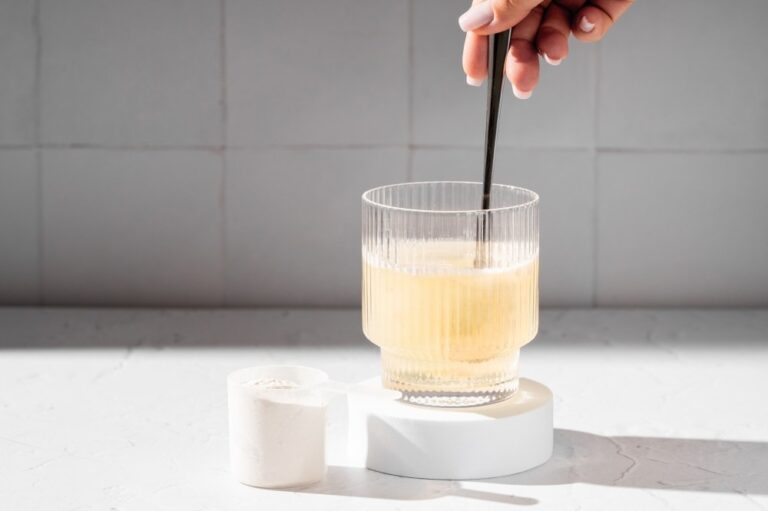As collagen supplementation gains popularity among wellness-focused women, fitness enthusiasts, and adults seeking joint and bone support, many users wonder: can collagen powder cause constipation?
Although collagen peptides offer impressive benefits for skin elasticity, gut health, and mobility, a small percentage of people report digestive changes when they first begin taking them.
Understanding why this occurs—and how to manage it—can help you optimize your results while keeping your digestion comfortable and consistent.
Why Collagen Powder Sometimes Causes Digestive Slowness

Collagen is a protein, and increasing protein intake can temporarily impact digestion in certain individuals. The effects are usually mild and short-lived, but several factors contribute:
1. Inadequate Hydration
Protein digestion requires sufficient water. If you increase collagen intake without drinking more fluids, stool may become harder and slower to pass. Hydration plays a direct role in preventing constipation.
2. Sudden Protein Increase
If you are not accustomed to daily protein supplementation, a sudden jump in intake may momentarily slow digestion. This is more common in individuals who consume low-protein diets or have sensitive digestive systems.
3. Lack of Dietary Fiber
Here’s can collagen powder cause constipation? itself does not contain fiber. Those who replace fiber-rich foods with protein powders may experience slower bowel movements simply because of reduced fiber intake.
4. Low-Quality Additives
Not all collagen supplements are created equal. Artificial sweeteners, gums, thickeners, or fillers may affect gut motility. Clean formulas tend to be easier to digest.
5. Individual Gut Sensitivities
Every digestive system is unique. Hormones, stress levels, gut bacteria, and lifestyle all influence how proteins are processed. Women with IBS or sluggish digestion can be more reactive to dietary changes.
Understanding the Role of Collagen in Gut Health

Here’s the ironic truth: while some people worry about constipation, collagen itself may actually support better digestion long-term.
Collagen peptides contain amino acids like glycine, proline, and glutamine, which help:
- Strengthen the gut lining
- Support mucosal integrity
- Improve nutrient absorption
- Reduce inflammation
- Promote healthy motility over time
Many individuals report improved digestion, reduced bloating, and enhanced regularity once their bodies adjust to daily collagen intake.
Signs Collagen May Be Causing Digestive Changes
If collagen may be affecting your digestion, you might notice:
- Slower bowel movements
- Harder stool
- Feeling “backed up”
- Increased bloating or fullness
- Temporary irregularity
These symptoms are generally mild and subside once hydration, fiber, and dosage adjustments are made.
How to Prevent Constipation From Collagen Powder

If you want to continue enjoying collagen’s benefits—without digestive discomfort—these tips can help:
1. Increase Water Intake
Drink at least one full glass of water with your collagen. Hydration helps move protein through the digestive tract efficiently.
When you’re not hydrated enough, you may also experience a dehydration headache — a dull, throbbing pressure that often gets worse with movement and improves once you drink more fluids.
2. Start With a Smaller Dose
Instead of starting immediately with a full scoop, begin with half a serving and gradually increase over 7–10 days.
3. Pair Collagen With Fiber
Add fruits, chia seeds, oats, or vegetables to your daily routine. Fiber keeps digestion balanced when adding protein.
4. Choose a Clean, Pure Collagen
Grass-fed, pasture-raised collagen peptides are easier for many people to digest compared to formulas with additives.
5. Take It at the Best Time for Your Body
Some people digest collagen better in the morning, others with meals, and some before bed. Test different times to find what feels best.
When to Consult a Healthcare Professional

If constipation persists for more than one to two weeks despite adjustments, or if you experience pain or significant digestive distress, it’s wise to consult a healthcare provider.
Persistent symptoms may indicate underlying digestive sensitivity rather than a collagen-specific issue.
Final Thoughts
Can collagen powder cause constipation? For a small number of individuals, yes—but typically only temporarily and often due to factors like hydration, fiber intake, or additives.
For most people, collagen is easy to digest and may even improve gut health over time.
With proper hydration, clean ingredients, and gradual dosage increases, you can enjoy collagen’s skin, joint, and wellness benefits without digestive discomfort.
For high-quality, clean, grass-fed peptides crafted to support your beauty and wellness naturally, explore the offerings from Root Vitality

